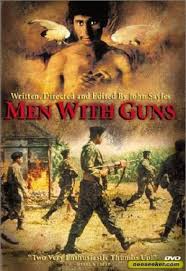
MEN WITH GUNS
US, 1998, 128 minutes, Colour.
Federico Jose Lupi, Damian Alcazar.
Directed by John Sayles.
In a Latin American city, well-respected Doctor Fuentes teaches medical students hoping that they will be of service to the poor. He decides to visit a number of his past students who have gone into the field and into some dangerous areas.
As he starts his journey, with warnings about armed guerillas and the military in the countryside, he discovers that one of his students was burned by men with guns. As he continues his journey with an orphan boy, Conejo, he hears of more deaths of his students, stories of destroyed villages and torture.
A deserter, Domingo, steals his tyres but later returns, wounded, and is cared for by Doctor Fuentes. They are also joined in their journey by a former priest who was ordered to be executed by his villagers. He escapes but the villagers are all massacred.
Finally, the doctor wants to go to the furthest village, hidden high in the mountains, hoping to find at least one of his students surviving. They are joined by a mute girl who has been raped. Dismayed by what he has found and the brutality of military and guerillas, he dies. But a young girl comes for help and Domingo takes the doctor's bag and accompanies her.
This striking movie was written and directed by John Sayles, a movie-maker with conscience. While a writer of clever popular movies for other directors, his own movies are far more serious and thoughtful like City of Hope, Passion Fish, Lone Star, Limbo. Here his approach is almost documentary-like, filming with a Hispanic cast and in Spanish. Mexico is the location.
Sayles is obviously moved by the political troubles that have tormented Latin Americans for decades. He is disturbed by the military clashes and the victimisation of villagers by the men with guns, whether they be military or rebel guerillas. In power struggles, it is the ordinary people who suffer.
In taking the story of a doctor who has stayed in the city teaching medical students over the years while not going out into the field for his own experience or to supervise his students, he highlights the impact of the heroism of those in the field who are willing to and do lose their lives.
He also takes the convention of the journey and an odd collection of characters who attach themselves to the doctor - an orphan, a mute rape victim, a deserter, an anguished priest. And, at the end, he gives his life - but he has empowered the deserter to take on and continue his mission.
1. The impact of the film? Characters? Message? Issues of justice, society? Oppression and violence? Heroism?
2. The work of John Sayles, his personal films, his concerns? His outreach to Hispanic audiences? Realism? Magical realism?
3. The title and its tone? Anonymous men? Oppressors? Availability of guns? Deaths – “because they have them”? The ideologies of men with guns? Ruthlessness?
4. The location photography, the doctor and his home background, the University? His travels, the villages, homes, the poverty? The wide range of landscapes? Mexico? The musical score?
5. The use of language, local languages, English?
6. Dr Fuentes, in himself, his career, a comfortable life, training young people to be doctors? His believing government propaganda? His decision to go to see the doctors, his family trying to persuade him not to go? Mission? His determination?
7. The mission, to see the doctors, the news of death? His wanting to see his students, having sent them out for experience? The bonds with the students? Abilities? Supervision and support? News of the death of the doctors, his determination to go on?
8. The visits, the dangers, the unseen enemy, hostilities, the experiences of people in the villages, of guns and deaths? People responding to him, telling stories, warning him to go? The reports of the situations?
9. His gathering people to go with him: the main encounters of the characters, their stories, Domingo, military, deserter? The young boy, no parents, his wisdom, advice? The young woman, brutalised, mute, raped? Padre Portillo, the former priest, about to be executed, not killed, the villagers killed in his stead, his loss of faith?
10. The purpose of the touristic husband and wife and their appearances, speaking in English, tourists in this land, the ancient sites, the discussions about art culture?
11. The Circle of Heaven, a real place, a mystical place, pure air, no guns, a paradise image?
12. The cumulative effect of the audience accompanied Dr Fuentes and experiencing what he experienced?